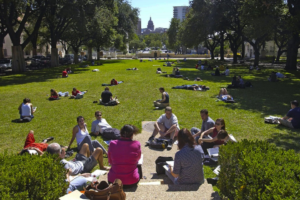 Substance misuse has long been a pain point on college campuses, and the University of Texas at Austin (UT) is no different. This week we talked with an organization that is pushing back against the engrained belief that substance misuse is a “rite of passage” for college students, and instead is offering a holistic model for shifting the conversation around substance use on campus. Kate Lower, Director of SHIFT, joins us to discuss the impact the COVID-19 pandemic is having on patterns of substance use among college students during this time of increased environmental changes and isolation.
Substance misuse has long been a pain point on college campuses, and the University of Texas at Austin (UT) is no different. This week we talked with an organization that is pushing back against the engrained belief that substance misuse is a “rite of passage” for college students, and instead is offering a holistic model for shifting the conversation around substance use on campus. Kate Lower, Director of SHIFT, joins us to discuss the impact the COVID-19 pandemic is having on patterns of substance use among college students during this time of increased environmental changes and isolation.
Shifting Perceptions
“SHIFT is really aimed at shifting the culture around substance use on college campuses,” Kate explains, “from this default norm that we have in terms of perception of substance use and often misuse as just being part of college life, and really shifting that conversation and that narrative to one that embraces holistic health and community health – one that allows all our students to really thrive and to feel part of a college experience, no matter what their choices are around substance use.”
One of the ways SHIFT hopes to address the student experience is through their six pilot projects. These initiatives seek to integrate multi-dimensional approaches to engage the entire UT community including students, faculty, staff, and alumni.
What We Know
Compared to other flagship universities, UT Austin is not unique in dealing with substance use and misuse on campus. Across the country, data shows that patterns of alcohol use and binge drinking on college campuses have not changed since the 1990s, when this information first started being recorded. At the same time, experts have seen patterns of cannabis use and other substance use on the rise.
While leveraging UT’s existing prevention efforts and support services for students, SHIFT hopes to further challenge some of the assumptions that this data suggests. “Why haven’t these numbers changed?” asks Kate. “What are some innovative ways we can look at this?”
Shifting Campus Culture… When Students Are Not on Campus?
Even though there are far fewer students physically on campus this year, the issue of shifting the campus culture around substance use still exists. “I remain concerned,” says Kate. “We want to keep the conversation going about how and why students are using. Isolating students and sudden changes in their environments can all be contributing factors to an increase in use or, for some, a decrease in use.”
To this end, SHIFT has made several resources available on its website directing students to support services with these factors in mind. For example, if you are worried about a friend, what might that conversation look like, when you are not able to be physically close to them? How can students who are feeling isolated find connection during this time of social distancing? “We really wanted to think through what those resources look like,” says Kate, “and what the vast experience of some of our students might be based on these really unique circumstances.”
Measuring a Culture
A culture is not something that can be easily measured using quantitative tools. In addition to collecting and looking at data about substance use on campuses, SHIFT has dedicated itself to defining ‘culture’ and looking at a variety of ways it can be evaluated.
“We know we are trying to reduce the negative consequences related to substance misuse,” explains Kate, “but we are also trying to enhance the protective factors that a student interacts with in order to thrive.” Each of SHIFT’s six pilot projects have their own measures and surveys to assess how conversations are changing, including looking at things like incident reports and seeking proposals from students who want to positively impact culture. “There’s a lot of different measurements that will tell our story and help us understand if what we are doing is working,” Kate says.
Students who want to get involved are invited to join SHIFT at one of their student advisory board meetings to help shape what SHIFT looks like. For faculty and staff, there are similar opportunities to serve in an advisory capacity. “When we are talking about student culture, we all make up a part of that culture,” says Kate. “We all shape it. Faculty, staff, students, but also alums and parents and anyone who identifies themselves as part of the UT community plays a huge role.”
Related content
- 3 Things to Know: Recovery
- In Their Words: On Recovery
- ITF Episode 51: The Social Entrepreneurship Model
Learn more about our podcast and check out other episodes!